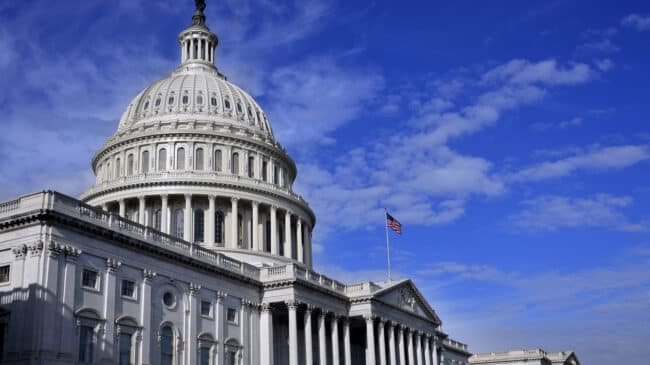If a government employer wants to change a public sector retirement program and give current employees a choice to stay in the current plan or pick a new retirement plan with a different employee contribution amount, the Internal Revenue Service will prohibit that option from being offered. This has become a significant obstacle to improving government retirement plans, as public employers are generally limited to only offering new modernized retirement plans to new employees unless the employee contributions are the same as before.
This IRS position has never been formalized. The agency has never issued proposed regulations that allow public comment; instead, it has been unilaterally adopted without any chance for public input or debate. It’s time for Congress to step in and force a change to remove at least one of the shackles holding back public pension reform.
This problem has been recently highlighted in North Carolina, which passed legislation in 2023 to change the retirement plans for the University of North Carolina Health Care System, East Carolina University (ECU) Medical Faculty Practice Plan, and ECU Dental School Clinical Operations.
North Carolina House Bill 259 provides, among other changes, that employees of these entities hired on or after January 1, 2024, would no longer participate in the state Teachers and State Employees Retirement System, or TSERS, and state retiree health plans. Instead, they would be given the choice of an existing defined contribution Optional Retirement Plan (ORP) or a similar new defined contribution plan. Importantly, existing employees would be given a one-time irrevocable option to stay with TSERS or move to one of the two defined contribution plans.
North Carolina State Treasurer Dale Howell, TSERS, and others have raised several important questions about ensuring the withdrawing institutions continue to pay for existing unfunded pension and retiree health liabilities. These systems should continue to be held accountable for paying for those promises and not shift fiscal responsibility to North Carolina taxpayers.
The controversy over the North Carolina bill does not end with employer withdrawal liability funding issues. Howell and TSERS also pointed out that allowing existing employees the choice to leave TSERS and move to a new defined contribution plan would likely violate long-standing and arcane federal IRS rules that strictly limit how such decisions can be made. Violating these federal compliance rules can seriously affect the Internal Revenue Code-qualified status of the plans involved.
The IRS restrictions on an employee’s choice of plans have become so firmly entrenched that public employers have almost stopped trying to get a different answer from the U.S. Treasury Department. The result has been the closing of a needed avenue for public employers to make changes required to modernize their plans for existing employees. If the Treasury Department can’t change its views on this issue, Congressional action should be pursued.
Why is the IRS so concerned about employers giving existing employees a choice of new plans?
The arcane world of 414(h) pickups and 401(k) cash or deferred arrangements.
The IRS’s restrictive views on these kinds of choices are tied up in a gordian knot of rule-making of the provisions governing so-called Internal Revenue Code (IRC) 414(h)(2) pickup arrangements and IRC 401(k) rules governing cash or deferred arrangements.”
Public sector retirement plans are considered tax-qualified under IRC Section 401(a) and often provide for both mandatory (non-elective) employer and employee contributions. Ordinarily, the employee contributions to a 401(a) plan are made on an after-tax basis. IRC Section 414(h)(2) allows public employers (not private sector employers) to pay for or pick up employee contributions. If done properly, the result is that the employee contribution is treated as a pre-tax contribution instead of an after-tax contribution. Nothing in the language of IRC 414(h)(2) says anything about what happens if the employer wants to change the plans in which the employee participates.
The IRS has never issued regulations around the 414(h) pickup provisions of the IRC, with the opportunity for the public to comment and argue for changes. Instead, it elected to unilaterally use revenue rulings and private letter rulings over the years to impose additional conditions on how employer pickup arrangements can occur. In Revenue Ruling 2006-43, the IRS added the additional requirement that an employer pickup arrangement may not allow an employee directly or indirectly to opt out of the pickup or change the pickup amount at any point after becoming first eligible in the plan. Opting out this way would violate IRC Section 401(k) “cash-or-deferred” election rules. These 401(k) rules do not allow qualified 401(a) plans like North Carolina’s Teachers and State Employees Retirement System to let employees make different salary reduction pre-tax contributions that a new plan might require.
Since issuing Revenue Ruling 2006-43, the IRS has repeatedly issued private letter rulings (PLR) to public employers, trying, in various ways, to allow current employees to choose a different plan to participate in with a different contribution rate. In each private letter ruling, the IRS has prohibited the employer from providing current employees the option to move to a plan that better suits their needs unless the picked-up employee contribution amount was the same after the change.
The IRS’ position is unreasonably restrictive and prevents needed public retirement plan modernization.
The IRS has, in effect, taken the position that the 401(k) provisions, which were originally designed to help employees make and change pre-tax contributions on an elective basis at any time, should, instead, be interpreted to prohibit employers from ever offering employees the chance to pick a new plan if it involves any change in the contribution rates under a governmental 414(h) pickup arrangement.
Public employers don’t make big plan design changes very often, and this fact alone should have given the IRS some reason to come to a different position. But it hasn’t. Currently, even if a public employer only makes a plan design change once every 10 or even 20 years, current employees must be locked into their contribution amounts. The result is that public employers are largely precluded from offering new plans with different contribution amounts to current employees.
The situation in North Carolina is just the latest example. This IRS fixation on making sure that not a dime of an employee’s retirement plan compensation can be exempted from taxation outside of the 401(k) rules is not a required interpretation under current tax law. It is a hyper-technical application of 401(k) plan regulations that could readily be avoided by simply writing specific new regulations for IRC Section 414(h), allowing more permissive approaches. But the IRS has so far refused to do so.
Despite requests to the IRS to take a different position, progress has yet to be made. A National Association of Public Pension Attorneys (NAPPA) report noted that federal legislation may be needed to force some relaxation to allow employers and employees the chance to make needed changes for current employees. The report further notes that there “may be more going on behind the scenes at the IRS with regard to further restrictions on employee elections among plans or tiers of benefits.”
If Treasury won’t make changes, Congress needs to order the IRS to make reforms.
This author’s experience and suggestion is that public employee unions, which oppose most pension reforms, may be influencing the U.S. Treasury’s position in this matter. Congress needs to step in and order the IRS to issue new IRC 414(h) regulations or amend IRC Section 414(h) itself to allow more latitude for public employers to make changes for current employees because the U.S. Treasury Department appears unwilling to do so. There is no good public policy reason why only new hires can benefit from retirement plan modernization.
Stay in Touch with Our Pension Experts
Reason Foundation’s Pension Integrity Project has helped policymakers in states like Arizona, Colorado, Michigan, and Montana implement substantive pension reforms. Our monthly newsletter highlights the latest actuarial analysis and policy insights from our team.

